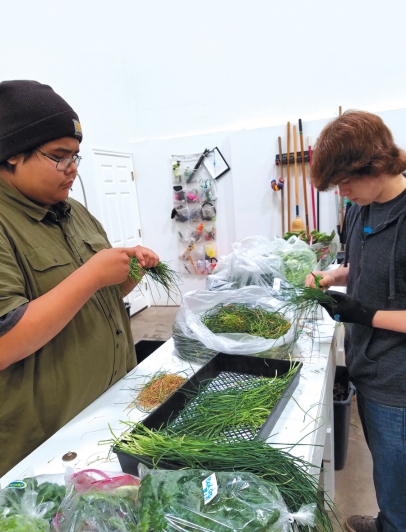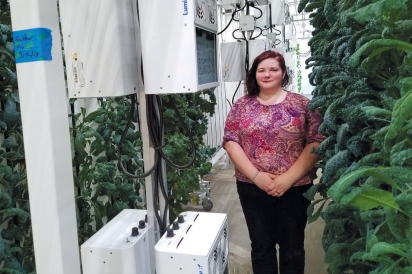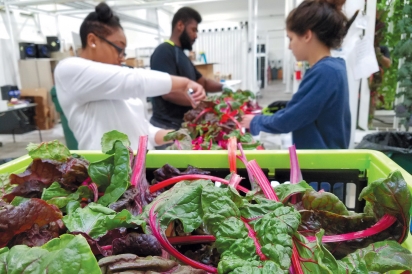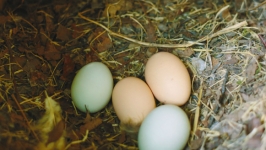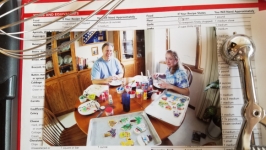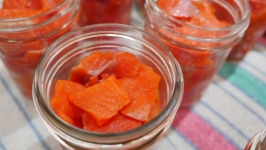How Alaska Seeds of Change Grows Food and Community
Driving near the Alaska Seeds of Change warehouse off Arctic Boulevard and 26th Avenue in Anchorage, you’d never know you were passing by an impressive vertical hydroponics system, flourishing with rows of fresh, fragrant Genovese and Thai basil and walls of proud, tall kale. It’s a leafy green food forest.
Inside the warehouse, the team affectionately refers to the hydroponics operation as “the farm.” In the processing area, I walked by several long, white tables in use for harvesting. There were piles of bright pink vegetable stalks with deep green leaves being hand-picked, trimmed, and sorted by youth staff. When I asked what kind of plant it was, a timid but enthusiastic teenager replied, “Rainbow chard. And you should see the root system. That color is in the roots, too. It’s so cool.”
Started in December 2016, the Alaska Seeds of Change program has a twofold mission: growing food while supporting Alaska’s at-risk youth. The program is young but mighty, showcasing a unique type of community mental health program that will soon be financially self-sustaining.
“Being in the nonprofit world is tremendously difficult. You see so many good programs come and go, even though they’re relevant and needed, because funding is so tenuous,” Seina Johndro, the program manager at Alaska Seeds of Change, told me. “We’re making money on our crops, and eventually we’ll make enough to completely support ourselves.”
When you’re surrounded by towers of buttercrunch lettuce and arugula, it definitely feels like you’re standing in the center of an epic urban farm. But the Alaska Seeds of Change mission isn’t just about learning how to be a farmer. The concept is simple. Youth often need help with personal and professional development. And hey, Alaskans love to buy fresh, local produce.
Alaska Seeds of Change offers part-time, paid positions to at-risk youth who benefit from life coaching and learning transferable work skills with increased levels of responsibility. The youth staff helps run “the farm,” tending to the plants, harvesting, filling purchase orders for restaurants and farmers markets, and gaining valuable work experience in a supportive environment.
“A lot of services designed for youth only go through age 18 or 21, so there’s a sharp drop off. But people aren’t automatically an adult when they turn 18, especially if you don’t have a good support network or if you don’t have anyone looking out for you,” said Johndro, who has a background in teen and young adult mental health. “Becoming an adult is a long process. We want to target that gap in the service system.” Although the program is meant for ages 16-24, 24 is used loosely, she said. “They can stay as long as they need us. We want to help them be successful.”
Once a week, Alaska Seeds of Change hosts life skills classes, or “adulting” as the youth team calls it. Topics vary week to week and cover everything from budgeting to buy a car to learning how personal credit scores work. For the youth staff, adulting sessions are paid training, adding extra incentive for attendance.
“Our adulting classes help me to understand the real world outside, like apartment hunting and how leases and landlords work,” said Cheyanne Horton, an energetic youth team member and my farm tour guide. “We’ve talked a lot about healthcare, so we know what it’s for and how you can get it. It’s a weird process to try to understand on your own.”
As one of the program’s more senior youth employees, Cheyanne’s responsibilities have increased. As part of the training, it’s standard for all youth employees to eventually learn how to give a tour of the facility. As Cheyanne walked me through each row of the 10,000 square foot warehouse space, explaining each step of the grow cycle and equipment used, she occasionally got a confused grin on her face and her eyes darted to Johndro for help. Each time, Johndro would return the smile, giving Cheyanne part of the answer, but encouraging her to use critical thinking to piece together the full picture.
“When they’re down on the farm, they’re obviously learning about taking care of plants and maintaining a unique hydroponics system. But they’re also picking up appropriate ways to communicate with people in a professional setting, and they’re learning problem solving skills that they can take away and apply to other parts of their life,” explained Johndro.
The youth who come to Alaska Seeds of Change are all interested in the program in their own way. Some of them, like Cheyanne, are passionate about growing things. But naturally, there are a range of interests. Once the full-time staff start working with a youth team member and discover their interests, they do whatever they can to help support development in those areas. “We had someone who was really into data entry and the numbers side of the operation, so we shifted his responsibilities to give him tasks that were focused on that,” said Johndro.
Alaska Seeds of Change is heavily focused on community youth development, but the business side of the program is steadily growing. “We’re getting busy. We’re adding new restaurant orders every week,” Johndro said.
Who are these awesome eateries supporting Alaska’s youth? At the time of this interview, Spenard Roadhouse, Marco T’s Pizzeria, Evie’s Brinery, Pangea Restaurant, Originale, Kenai Food Hub, Alaska Food Network, and J&J Food Market all treat their patrons to at least one local, super-fresh leafy green or herb from Alaska Seeds of Change. You’ll also find Alaska Seeds of Change at the Anchorage farmers markets, where youth staff help to run the booth, learning the sales and customer side of the operation.
After talking to Cheyanne, market work definitely seems like a crucial piece of the Alaska Seeds of Change transformative experience. “Some of the youth employees who I’ve talked to, when they first start working in the markets, they were scared,” Cheyanne explained. “But I kept reassuring them that they’re going to be fine. You just say ‘hi’ and talk about the plants. Be friendly and answer questions for customers. Then whenever they’re ready to buy something, if you need help, you have a full-time staff member to walk you through the process.”
“Everybody gets a little bit nervous for their first market, but then they have fun,” said Johndro. “It’s just a new thing for them to learn.”
The Alaska Seeds of Change program is based on a model called “positive youth development.” The idea is that if you believe in young adults, and you trust them with increasing responsibilities, they will succeed and flourish. New youth comes in the door, they learn, then they help pass that knowledge onto others. The more time a youth team member invests, the more they develop into leadership positions and build confidence along with learning life lessons.
The program aims to keep youth team members for 6-12 months. Unlike a typical job where talking loudly about interviewing elsewhere is taboo, youth team members are encouraged to discuss other potential employment. Whenever someone feels like they’re ready to move on, the staff helps them create a resume and find new, more permanent, opportunities that align with their career goals. Alaska Seeds of Change is a stepping stone to support and prepare youth for their next endeavor.
“Even though youth staff is only here for a short time, ultimately, this isn’t a short-term thing that we’re doing,” Johndro told me. “I hope the youth who are working with us now want to come back and join us for meals from time to time, or bring back a skill to share with future adulting classes. We want to be so much more than just a job. The goal is to invest in our youth and become a lasting part of the community.”
While food has always brought people together, Alaska Seeds of Change has tapped into a significant relationship between growing food and supporting our youth. And hopefully the program will continue to blossom.
> For more information visit: akseedsofchange.com


